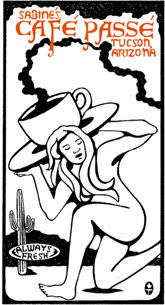
For me literary translation is a yoga, a labor of love, and a form of homage to both individual writers and poets and to Mexico, the country where I have lived for most of my life. For many years now, with one exception, and not counting the work of editing a magazine and an anthology, I’ve focussed on translating Mexican contemporary poems and short fiction that, with a bit of effort (and on occasion, by synchronistic magic) end up in literary magazines and small press anthologies. Payment usually: two copies of the publication. News flash: Not a way for anyone to make a living. But it is a wonderful thing to do, and I sincerely encourage writers and poets– most especially poets– to give translation a go. You don’t need to speak the original language fluently (though I do, in fact, speak Spanish fluently). The important things are firstly, getting permission (usually not a problem); secondly, a willingness to make the dedicated effort to understand the original (which may require a dictionary and the help of a native-speaker); and thirdly, an ability to render the work with equivalent art in one’s own language. This is why poets so often make the best literary translators, even when they cannot speak the original language.
Our world needs translation. It’s such fun to be able to share a discovery. Sometimes in undertaking a translation one makes a new friend–or deepens an already existing friendship. And from a purely selfish point of view, for the translator it can be a most stimulating and refreshing exercise in wrestling with the languages– the original language and one’s own. As an artist, translation shakes me up, it keeps my own writing and poetry fresh.
I’ve got a long list of translation projects… many to be aimed at literary magazines, and a few with more commercial possibilities…. right now, however, I’m still working on my Far West Texas book and, relatedly, the 22nd podcast for the Marfa Mondays series, which I hope to be able to post this month. But next month at the American Literary Translators Association (ALTA) virtual conference I will be back on Planet Translation, albeit briefly, to read an excerpt from a short story by Mexican writer Rose Mary Salum. Apropos of that upcoming powwow, here’s a post from the archives about my reading of a poem by Agustín Cadena at that same conference in 2015. I’m not Cadena’s only English language translator, by the way– my dear and esteemed amiga poet and essayist Pat Dubrava has also translated a large batch of Cadena’s short stories. They are brilliant. She’ll be reading some Cadena at this next ALTA.
Café San Martín: Reading Mexican Poet Agustín Cadena
at the Café Passé in Tucson, Arizona
Originally posted on Madam Mayo blog December 14, 2015

Sparkling sky and only a jeans jacket on the night before Halloween, University of Arizona students everywhere, in witches’ hats and zombie makeup: that’s how it was in Tucson when, as part of the American Literary Translators Conference “Café Latino” bilingual reading fiesta at Café Passé in Tucson, I read my translation, together with the Spanish original, of Mexican poet Agustín Cadena’s poem “Café San Martín.” That translation appears in poet Sarah Cortez’s recent anthology, Goodbye Mexico (Texas Tech Press).
> Read Cadena’s poem and about Goodbye Mexico here. (NOTE: This link goes to the old blog on blogger.com. I’ll update the link as soon as this post is migrated.)

Alas, Cadena could not be in Tucson because he lives in Hungary, where he teaches Latin American Literary in Debrecen. Follow his blog, El vino y la hiel.
Cadena’s name and many works — he is incredibly prolific and writes in almost every genre–were mentioned many times over the course of this year’s ALTA conference. My dear amiga Patricia Dubrava, who also translates Cadena’s poems and short fiction, shared a panel with me on the following day.
> Read about that panel, and my talk for that panel, here.
It was an extra special honor to read Cadena’s poem and my translation because not only is Cadena a treasure of a writer– among the very finest Mexico has ever produced– moreover, he has translated many of my works, including the most recent Metaphysical Odyssey into the Mexican Revolution (as Odisea metafísica hacia la Revolución Mexicana).
The audience was also especially distinguished, including Jeffrey C. Barnett, Mary Berg, Ellen Cassedy, Dick Cluster, Pamela Carmel, Jill Gibian, Jesse Lee Kercheval, Suzanne Jill Levine, Angela McEwan, Barbara Paschke, Liliana Valenzuela, and so many other writers, poets and literary translators of note.
And a very special thank you to Alexis Levitin, my favorite Portuguese translator (and, by the way, editor of Brazil: A Traveler’s Literary Companion), who organized and MC’ed the reading.

Q & A: Ellen Cassedy,
Translator of On the Landing by Yenta Mash,
Master Chronicler of Exile
Spotlight on Mexican Fiction: “The Apaches of Kiev”
by Agustín Cadena in Tupelo Quarterly and Much More
Translating Contemporary Latin American Poets and Writers:
Embracing, Resisting, Escaping the Magnetic Pull of the Capital
